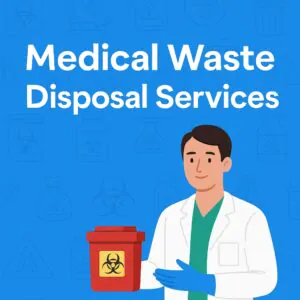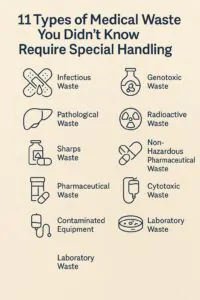Medical waste isn’t something most healthcare professionals think about daily—but it should be. In bustling cities like Houston and Dallas, where healthcare activity is high, understanding the types of medical waste is vital. Proper handling isn’t just about compliance—it’s about protecting public health, the environment, and your staff.
MedCycle, a leader in medical waste management Houston, ensures that every type of medical waste is handled professionally, safely, and in compliance with both Texas and federal regulations. In this comprehensive guide, we’ll walk through 11 types of medical waste you might not realize require special handling, why each matters, and how the right medical waste services make all the difference.

Table of Contents
Toggle1. Infectious (Biohazard) Waste
What it is: Items contaminated with pathogens—think blood-soaked bandages, used PPE, disposable gloves.
Why it matters: Infectious waste can spread diseases if not securely contained and treated.
How to handle it: Use leak-proof, clearly labeled biohazard containers. These items must be treated—via autoclaving or chemical disinfection—before proper disposal.
Sharp Red Bag Medical Waste Disposal+1
2. Pathological Waste
What it is: Human tissues, organs, body parts, or fluids from surgery or autopsy.
Why it matters: Beyond being biohazardous, these materials demand respectful, secure handling.
How to handle it: Pathological waste must be incinerated or treated with equal rigor. MedCycle ensures proper protocols and documentation.
Sharp Red Bag Medical Waste DisposalTCEQ
3. Sharps Waste
What it is: Needles, scalpels, lancets, contaminated glass—anything that can puncture skin.
Why it matters: Needlesticks carry a high risk of transmitting bloodborne pathogens like HIV, hepatitis B, and C.
TTUHSC El Paso+8Wikipedia+8Daniels Health+8
How to handle it: Dispose of sharps in FDA-approved puncture-resistant containers. Never recap or bend needles—standard protocol for medical waste services.
4. Chemical Waste
What it is: Lab solvents, disinfectants, reagents, and cleaning supplies.
Why it matters: Many are corrosive or toxic and pose an environmental risk if improperly disposed.
How to handle it: Segregate into secure, labeled containers. Only certified disposal partners like MedCycle should manage these hazardous liquids.
Environmental Health & SafetyMedcycle
5. Pharmaceutical Waste
What it is: Expired, unused, or contaminated medications and vaccines.
Why it matters: Drugs flushed into water systems can disrupt ecosystems—or worse.
How to handle it: Keep pharmaceutical waste separate from other waste categories. MedCycle follows DEA and EPA guidelines for safe, verifiable disposal.
TCEQ+15Environmental Health & Safety+15Daniels Health+15
6. Genotoxic Waste
What it is: Materials containing mutagenic or carcinogenic agents—often from labs or chemotherapy treatments.
Why it matters: These substances can cause permanent genetic damage or cancer at very low doses.
How to handle it: This high-risk waste must be segregated, labeled, and managed by specialists. MedCycle uses strict protocols to ensure safe handling and disposal.
7. Radioactive Waste
What it is: Waste from nuclear medicine, radiology, or research sectors.
Why it matters: Exposure risks can be catastrophic without proper containment.
How to handle it: Use lead-lined containers, store in rad-safe zones, and follow DOT and NRC regulations for transport and disposal.
8. Animal Waste (Laboratory or Veterinary)
What it is: Carcasses, bedding, or tissue from animals exposed to pathogens in labs or vet clinics.
Why it matters: Animals can carry infectious agents—risking cross-species transmission.
ENVCAP+2HerCenter+2
How to handle it: Depending on local regulations, options include incineration, steam treatment, or supervised burial.
9. Laboratory (Microbiological) Waste
What it is: Cultures, samples, test tubes, petri dishes, and lab equipment used with infectious agents.
Why it matters: Without treatment, these objects pose a serious risk for pathogen spread.
How to handle it: MedCycle ensures these items are autoclaved or chemically sterilized before transport.
10. Contaminated Single-Use Medical Equipment
What it is: Things like IV lines, tubing, single-use instruments that can’t be sterilized for re-use.
Why it matters: Even without visible contamination, these items present hidden risks.
How to handle it: Items must be segregated and disposed as medical waste. Avoid landfill contamination by using MedCycle’s protocols.
11. Non-Hazardous Pharmaceutical Waste
What-it is: OTC medications or supplements that are not environmentally toxic—but still need proper disposal.
Why it matters: Even seemingly innocuous meds can pollute waterways.
How to handle it: Collect non-hazardous meds separately—then dispose through regulated programs, not the trash.

Why Knowing These Types Matters for Medical Waste Management in Houston and Dallas
Texas facilities must follow defined categories from the TCEQ’s Medical Waste Rules (30 TAC 326), including—but not limited to—animal waste, bulk blood, pathology, sharps, and microbiological waste.
ENVCAP+4TCEQ+4BioMedical Waste Solutions+4
Disposal rules also require:
-
Correct segregation
-
Secure storage
-
Licensed transport and disposal
-
Up-to-date documentation and staff training
BioMedical Waste SolutionsTCEQ
Mixed or improperly sorted waste can bring serious fines—hundreds to thousands per incident.
How MedCycle Makes Medical Waste Services Breath of Fresh Air for Houston & Dallas Providers
Tailored Waste Audits
Every site gets a customized audit—understanding your waste volume, types, and facility risks.
Comprehensive Services
MedCycle handles:
-
Segregation tools
-
On-time pickups for all waste types
-
Treatment at approved facilities (autoclave, incineration, chemical)
-
Full documentation for audits and inspections
Ongoing Training & Support
Includes annual staff sessions on safe handling and updated Texas-specific compliance requirements.
Eco-Friendly Practices
Where possible, we use energy-efficient tools and recycled disposal methods—striving for sustainable medical waste management Houston can be proud of.
FAQs About Types of Medical Waste & Disposal in Houston & Dallas
What is the difference between infectious waste and pathological waste?
-
Infectious waste refers to contaminated dressings or fluids.
-
Pathological waste is human tissue or organs that require respectful handling.
TCEQ+15Sharp Red Bag Medical Waste Disposal+15MedPro Disposal+15HerCenter
Are sharps always considered medical waste?
Yes. Even uncontaminated sharps pose injury risks and must be disposed of in specialized containers.
Wikipedia+2University of Houston+2
What qualifies as genotoxic waste?
It’s material containing cancer-causing or mutation-causing agents—requires special handling and disposal.
Do I need TCEQ registration to dispose of waste?
Generators (clinics, hospitals) must register with TCEQ and follow all rules for segregation, storage, and disposal.
Daniels Health+7TCEQ+7BioMedical Waste Solutions+7
Are veterinary waste types regulated the same way?
Vet waste—particularly from diseased animals or research animals—is often classified similarly to pathological or microbiological waste. MedCycle treats it accordingly.
ENVCAP
How should non-hazardous medications be disposed of?
They should not go in regular trash. Better to go through pharmaceutical take-back programs to limit environmental harm.
Final Thoughts
Understanding these 11 types of medical waste—and how to manage each—is essential for safe medical waste management Houston facilities and beyond. From infectious materials to lab cultures, each type has its risks and regulations.
With MedCycle’s expertise in medical waste services, including training, compliant disposal, and eco-conscious strategies, your facility can protect staff, patients, and the community.
Be a part of a cleaner, safer Houston and Dallas—one container at a time.
📞 Contact MedCycle Today
Let’s talk about how we can help your clinic stay compliant, efficient, and secure.
📍 Serving: Houston | Dallas | Katy | Plano | Sugar Land | The Woodlands | Frisco
📞 Call 281.789.0202
🌐 Visit https://medcycle.com/contact
💬 Request a Free Quote in Minutes
Protect your clinic, your staff, and your community—with MedCycle.
Follow us on
Instagram and
Facebook
to stay in the loop on all the latest deals!
